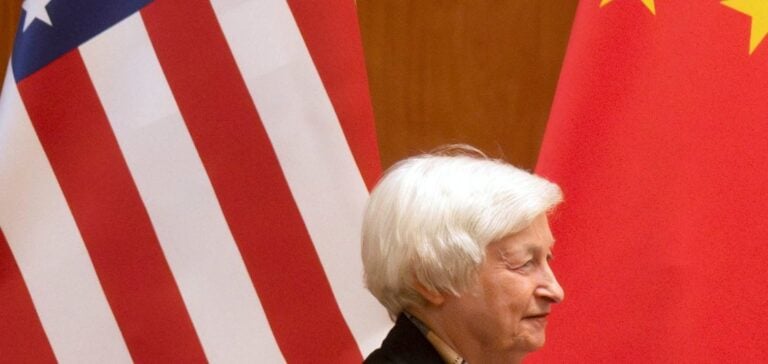US Treasury Secretary Janet Yellen has sounded the alarm over China’s oversupply of key sectors such as electric vehicles, lithium-ion batteries and solar energy. Speaking in Frankfurt, Yellen stressed that this overproduction poses a significant threat to the development of clean energies worldwide. She insisted that this issue would be a priority at the G7 Finance Summit, to be held this week in Italy.
“China’s industrial capacity is currently leading to production that far exceeds global demand in key sectors, including electric vehicles, lithium-ion batteries and solar energy.” Adding that: “This poses a threat to the development of clean energy industries worldwide”, including in emerging markets, and the subject will be “one of the priorities at the G7 in Italy.”
A global challenge
Western countries worry that massive Chinese government subsidies will create an influx of low-cost products, threatening foreign competitors in green technologies. Yellen stated that the current situation calls for greater coordination between Europe and the United States to preserve the viability of companies in these sectors. She also warned that if strategic measures are not taken, the clean energy industry could suffer irreversible damage.
China’s reactions
Beijing dismissed these concerns as unfounded. China maintains that its industrial policies are not designed to destabilize world markets, but to support its own development. However, the reaction of the United States and the European Union was firm. The European Commission has launched several investigations into Chinese subsidies, while the United States has imposed new tariff s on Chinese high-tech products.
A call to concerted action
Speaking at the Frankfurt School of Finance and Management, Yellen called for international collaboration to meet this challenge. She asserted that China’s growth, which now accounts for 20% of global GDP, requires a coordinated response from Western countries. In her view, the future of the green industry depends on the ability of the USA and Europe to work together to counter the effects of Chinese overproduction.
Challenges for the G7
The G7 summit in Italy will be an opportunity for the leaders of the major economies to discuss this issue. The aim is to find solutions to balance the global clean energy market and protect local industries. Discussions will also focus on how to strengthen supply chains and encourage innovation in green technologies.
Future prospects
Next steps will include discussions on improving industrial and trade policies to adapt to current economic realities. Yellen emphasized the importance of a strategic and mutually supportive approach to ensuring the sustainability of businesses and promoting the balanced development of clean energies. The international response to this situation could define the future of green technologies and their role in the global energy transition.
Janet Yellen’s concerns about Chinese overproduction highlight a crucial challenge for the development of clean energy worldwide. The upcoming G7 Finance Summit will be a decisive step in discussing strategies to protect local industries from the impacts of this glut. By working together, Western economies can hope to establish a more balanced and resilient market for green technologies. Furthermore, the future of renewable energies will depend on the ability of the US and Europe to work together effectively to counter the disruption caused by Chinese subsidies, and to foster sustainable innovation in the global energy sector.





















